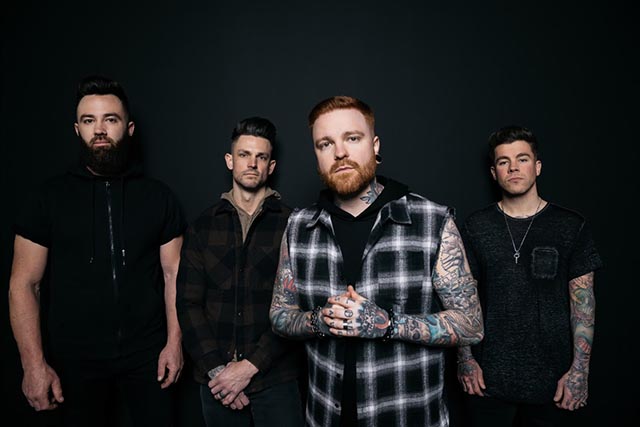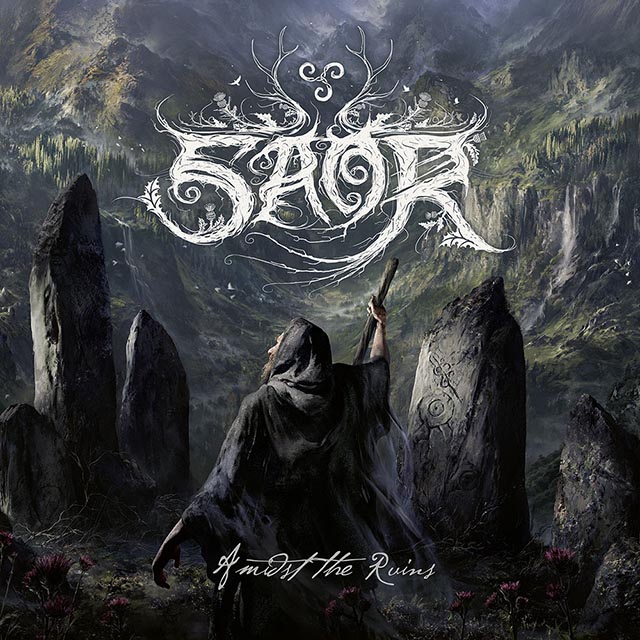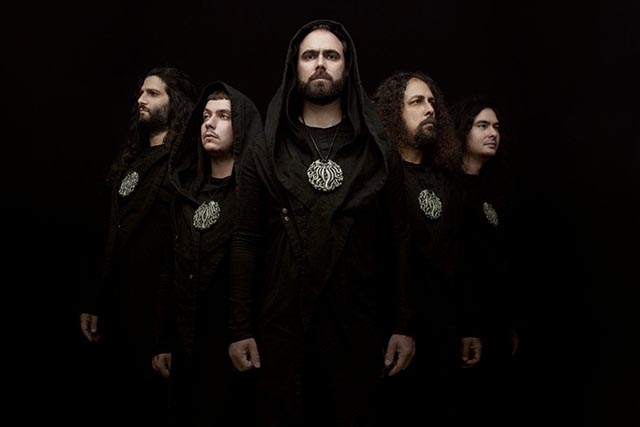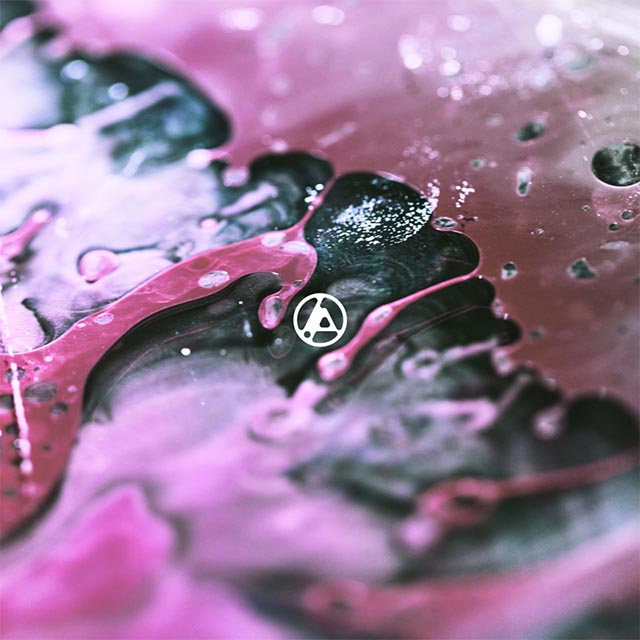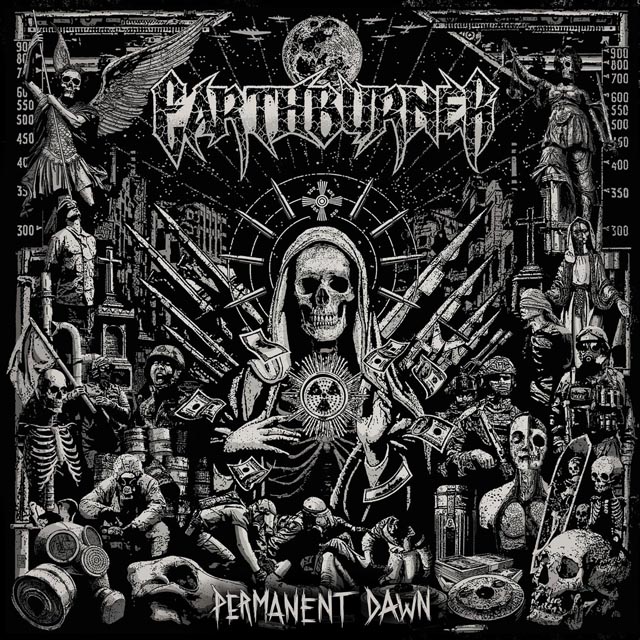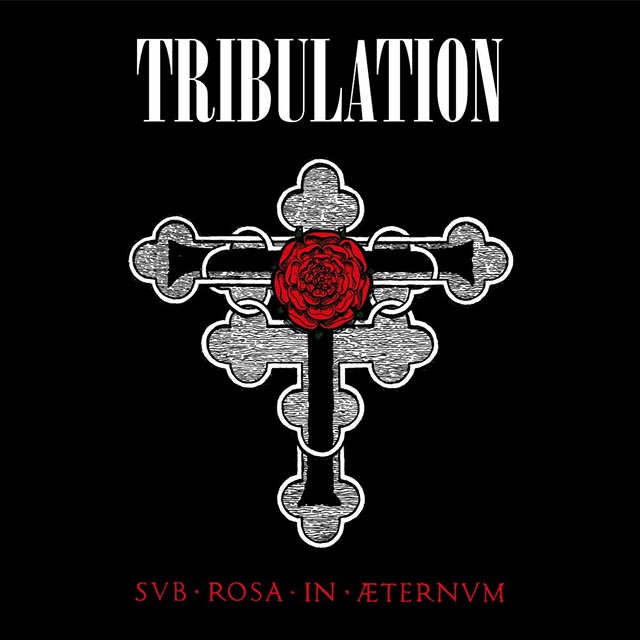 Cannibal Corpse may have completed Mayhem Fest, but the year is only going to get busier for the death metal legends. That’s because Cannibal Corpse’s 13th studio album, A Skeletal Domain, will come out on September 16. Yet if album number 13 proves anything, it’s that Cannibal Corpse are nowhere near slowing down or becoming less tame any time soon (even after 26 years as one of the most brutal death metal bands of all time).
Cannibal Corpse may have completed Mayhem Fest, but the year is only going to get busier for the death metal legends. That’s because Cannibal Corpse’s 13th studio album, A Skeletal Domain, will come out on September 16. Yet if album number 13 proves anything, it’s that Cannibal Corpse are nowhere near slowing down or becoming less tame any time soon (even after 26 years as one of the most brutal death metal bands of all time).
During Mayhem Fest’s stop in Camden, NJ earlier this month, we sat down with drummer Paul Mazurkiewicz. In addition to providing us his top five favorite Cannibal Corpse album covers, Mazurkiewicz discussed the biggest benefits (and challenges) that came with working with producer Mark Lewis for the first time on A Skeletal Domain, how he was able to overcome writer’s block at the last minute while in the studio, and what he feels are the key sources to Cannibal Corpse’s longevity.
It’s been five years since Cannibal Corpse first appeared on Mayhem Fest. How different has it been playing this year compared to the last time?
Not too different, but the big thing I think is really the line-up. When we did it in 2009, we had Slayer, Behemoth, and The Black Dahlia Murder. I mean, we had a big, heavy contingency of bands. More [bands] our style I should say. This tour has been great, there’s great bands on it, but I think that having Slayer for us on the main stage, that’s a big deal. I would think a lot of their fans would probably like us as well, but this time we’re really kind of a fish out of water.
Cannibal Corpse is definitely the most extreme band on this year’s lineup.
Exactly, which is cool! We’ll take it, because that’s why we’re here. We’re here to try and widen, broaden the fan base I guess, play in front of new fans.
Which is a great thing to do.
Exactly, nothing wrong with that. I mean, we did it at Mayhem in 2009, I’m sure it was very similar in that way as well, but this time around a little bit more so because of the lack of the heavy/brutal bands on this run. But it’s been a great one, it’s been a great tour so far, we’ve had some great shows, getting’ great responses.
That’s great. Last year, you guys celebrated your 25th anniversary with a handful of shows. It’s amazing to think it’s been 25 years. What would you say is the key source to such a longevity?
We just been doing our thing, really. Since day 1, we’ve always had a good work ethic I believe, staying active, practicing, playing, just being in the public eye. I also hope it’s because we write decent music, because that’s what we’re talking about here. It’s always going to come back to the music with bands I guess. We don’t go through the motions, we never have, and that’s apparent. The fans, they know, they see that, they feel that. Every release we put out we give it our all, we do 110% for the given timeframe, but really it’s just those things, staying active, just really having the work ethic to keep on going. We’ve never stopped in these 25 years, we just been constantly going, and I think that’s key.
Did knowing that its Cannibal Corpse’s 25th anniversary have any effect on the new album?
No, not at all.
Just the same old situation?
Just the same old situation. If anything, we’re just getting better as we go, as older as we get. I think mentally, you kind of get more aware, you start doing thing differently, and we really are on top of our game than we ever have been. Even though we’re all much older than when we started, I believe we are a better band now, and that just came with evolving, maybe maturing a bit or what have you, but having the experience to get to this point. To just work on the little things to try and make a better song, to make a better sounding album and all that kind of stuff, and I think we’ve achieved that.
This is the first time you’ve worked with Mark Lewis also. What inspired you to work with him after three albums with Erik Rutan?
Well first off, Erik is a great producer, a great friend of ours, and did an amazing job on all three records. I think we just felt it was time for a change, just don’t want to get complacent with the same producer. It just kind of adds a little excitement when working with someone new, going to a new studio and all that. Mark, of course, has been doing some great work in the last 5, 6, 10 years.
The whole Audiohammer Studio crew has.
Right, all three of those guys, it’s unbelievable. They got a great thing going, and they do a great job, and we just worked with Mark on this. I know Jason [Suecof], and of course we used Eyal’s [Levi] house as the drum room, if you’re familiar with how Audio Hammer is set up. I mean, Mark has done some great work, and we just said “We know he can make a great sounding Cannibal record, so why not give him a chance?” We knew it wouldn’t be any lesser than say what Erik with Torture, if not we’re gonna get at least that. Hopefully we get better, and I think we got better actually.
There’s a lot of times when a producer really does take on a big role when working with a band. What would you say was the biggest difficulty, if anything, with working with someone new?
Of course after three records with Erik, you get in a groove, you know what to expect, you know how he is. I think I met Mark before, but this was the first time being around him as a person. You’re with a stranger basically, even though you’re there for a common goal. We became friends of course pretty quick, but it’s a little strange at first. Mark brought his own little subtle things that he does, like every producer probably would do. He makes his suggestions, and tries to just make the most out of any musician, and do the best they can. For me it was, I’ve been using pretty thin sticks for the last few years, I kind of went from heavy sticks, always changing things up, but the last few years I’ve been using thinner sticks. I felt for speed and it was helping me out. Soon as we got in the studio, Mark goes “Man, these are the sticks you’re using? Think we could try to use heavier sticks?”
That’s a big change to ask a drummer to make!
It is, and you know what? Nobody ever told me that before. No producer has ever said “Hey, let’s try to use…” And when he told me I was a little like “Uhh… man, I’ve been playing with these sticks, and practicing these songs [with these sticks], and now you want me to use a heavier stick, which is going to obviously affect me in some ways. We don’t even have time to practice, I’m on the fly!” But he’s the producer, his mentality was that we’re going get more velocity, we’re going get heavier hits because of the sticks, and it’s going to sound better on the record. Maybe 10 years ago I would have said “Efff off, no way.”
Well it takes a lot of balls for anyone to ask something like that from a musician.
Right, exactly. But he knew, he’s a producer, he knows what it’s going take to make things work. He’s done it before, so I went with him. I said “You know what, I’ll do it.” It killed me almost. My arms and shoulders, for those first few days were like “Oh man!” But it sounds amazing. I’m glad he told me that because I wouldn’t have made that suggestion on myself, I would have just played with the sticks I use, and it’s a comfort thing for me being a drummer. So nobody ever told me that, and the fact that he did, I went “You know what? I’ll do it because you obviously know more than I do, and if it’s going to make the album sound better, then I’ll suffer through what I need to do to get this done, and get it done good.” So that’s what happened, and as soon as I finished recording, I moved up to the heavier sticks because I kind of wanted to anyways, but I didn’t expect it to happen right in the middle of starting to record!
It’s like getting ready to play a football game and all of a sudden the coaching saying “Ok, we’re gonna switch you from quarterback to running back.”
Exactly, or “Hey you’ve been wearing these cleats for so long, now you’re gonna wear different shoes.” It’s so personable of a thing. It would be very tough to change on the fly like that, but I did it, and I think it worked for the better.
When we spoke to [bassist] Alex Webster, he was saying how though he sometimes reads books about gruesome real life instances, he doesn’t pull from anything direct to get inspired for lyrics. How do you personally stay inspired to continue to write dark, violent music after all these years.
It’s very strange these days. We’ve been doing it a long time of course, all of us writing lyrics and everything. I just delve into my own imagination at this point, the way I do it. it’s not like I’m thinking of these things on a daily basis, not like I’ll be walking back to the bus and go “Oh hey, I got a great song idea for the next record!” I’m not thinking of these things whatsoever. When the time comes to think of those things, we sit down and it just comes out for me. I just really delve into my own imagination. I guess we have been absorbing things for years, real life stories, books, all that stuff is embedded in us. So for me in particular, I don’t need to go “Oh okay, we’re gonna start writing lyrics, let me start gathering sources of inspiration.” To me they’re already in there, I just gotta pull it out, and I’m pulling it out when it comes down to “Oh alright, we need song titles!” That’s where the brainstorming starts, and once we have song titles, I never work usually the other way. I always have my song title working, which then gives me my idea of where I want to go with that song.
Interesting, so the song title typically comes first/before the actual lyrics?
For me it does. That’s my starting point. Once I have that song title and it’s set, then I can kind of figure out where I want to go with that story. And then sometimes it might even take where, I don’t know where I’m going until I get a few lines down there. Then it’ll come from there, but it’s more of a generalized thing because we don’t really want to write about specific things that have happened. Of course, in coincidence, a lot of these things probably have happened.
Well we live in a fucked up world!
Exactly, so of course our stories are going to be more generalized I guess for those reasons.
Have you ever had a writer’s block at any point, just a moment where you went “Oh my god, I just can’t think of something that sticks”?
It’s weird, I looked at how this album went, how I was writing this record. I had the lyrics for Torture done for my song a lot earlier than this time around. We were so busy on just getting the music down, and then a lot of the lyrics didn’t happen until we were actually done with the music, or I think I might have had one song done even before we went in. It’s weird, because I remember going “Man, I just wasn’t feeling inspired,” just like to sit down go “okay I’m gonna write.” I don’t know, [there were] a couple times I just didn’t feel it, but I knew I would get it done when I needed to get it done. Come crunch time, it was “I have no choice now, you got to sit down, you’ve got to get it done.”
So there wasn’t really anything specific you could do to get out of that rut, just more or less succumb to the pressure of time?
Yeah, that’s what it kind of was, that’s what it ended up being because I wasn’t even feeling it. Torture, I was feeling it. There were times I was like “Man I just want to write lyrics, I’m in that mode, I’m zoned,” and we got some lyrics done way in advance, always a good thing. This time around, I’d sit around and I’d maybe write a line. I just wasn’t feeling the inspiration there, but I knew I had to get the stuff done, When it finally comes down to “Oh, no, we have to get it done now! If we don’t get it done now it’s not going to happen. Okay, let me focus, let me sit down.”
It’s funny, there’s a story on that. We did my songs first, George [Fisher, aka Corpsegrinder] came in and I wrote 6 songs, half the album lyrically. And there was one left that I needed to write, and George was singing his songs already, and good thing about him, the way he learns [is] he can hear a song and only have a day or two to work, and he gets it done and it sounds good. But “Hollowed Bodies,” the last song on the new record, I remember going “Okay, George has got two songs to do today, tomorrow will be our last day, and that’s the song he’s gonna have to sing, is that last one that I need to write, otherwise we gotta back and all that.” I just told him, “Alright man, you do these songs, I’ve got to go back to the hotel and write this song,” and I did. I did it, I wrote the song in maybe 3-4 hours.And know what? I think it’s one of my best lyrics, the way it all came to me. I just sat in the hotel room, saying “I have to get this done!”
Sometimes pressure really is the best influence!
Right! And I said, “Oh cool, I got this idea, alright yeah.” I wrote the song, I got real excited, I got it done, I did the scratch tracks that night for him, and he sang it the next day. But it was kind of weird how that one came just like that. If it didn’t, it would have been tough, I would have been like “Well, we didn’t get this one done. I’m going to have to take it home and work on it, we’ll have to come back and do it.” Kind of weird how that works.
[youtube]https://www.youtube.com/watch?v=iuRWK17T4_M#t=111[/youtube]
While the band is famous for its pretty violent lyrics, it’s also known for its equally violent cover artwork. What was the thought process behind the cover for A Skeletal Domain.
Well we obviously released a pretty brutal cover with Torture, and if you look back at a lot of our covers, we have the brutality but we always mix it up. The Bleeding, there was nothing really brutal. Kill, of course [there was] nothing. Even Evisceration Plague, it’s artwork but there’s nothing really that brutal about it. So I think we felt like, “Ok, we did Torture, brutal cover,” and talking to the record label too, I know how they are marketing. It’s harder to have those kinds covers out there in the public.
You mean a fetus coming out of a corpse’s vagina is not marketable?
Exactly [laughs]. I know, right? It’s a little tough if you want to be getting into some major chains, and all that kind of stuff. But anyway, we always felt that the music comes first. The artwork is really secondary. It was never made to be like “We need to shock people!” We’ve got covers that we like as fans, and that’s why those covers came about in the early days, because we just wanted something as a fan of music to see. We wanted to walk in a record store and see that and go “Oh my god!” That’s what we would have done growing up, and of course, that’s what we did. And that was always our mentality, but as I said, it was always the music first. We didn’t want to have to rely on artwork and have people go “Oh the artwork’s great, but they’re a terrible band.”
We want it to compliment the music, of course. We always felt that with our favorite bands, it was always complimenting the music and the covers went and in hand, like with Slayer or Kreator and all that. But this time around, when we ended up working on the songs, especially when we came up with “A Skeletal Domain,” Pat was writing the song and we went, “Man, this is just an epic song, really is an epic Cannibal song, It sounds like a title track,” kind of thing. So we said, “Ok, well it’s a cool title, cool name, we like that, why not go a different route, be a little more mysterious with the title.” And I think we kind of do that as well. We’ve got Evisceration Plague, we got Kill, we got Torture, this one being a little different title, but we also of course wanted art to fit that title.
I mean, it’d be weird not to have a skeleton of some sorts on the cover.
Right, it needs to be what it is. Torture needed to be what it was, it made sense what the album cover was. With A Skeletal Domain, it had to be what it was, a little more eerie, a little more just the landscape we came about with. I wrote the lyrics to that, and I came up with the storyline for A Skeletal Domain, so it was kind of like “Well, let’s see if Vince [Locke] can interpret my lyrics to what he thinks the album cover would be, what A Skeletal Domain was.” Sure we helped him out, we gave him some ideas, and we worked in conjunction with him, but we wanted something like what A Skeletal Domain is, just a really eerie, dark piece of artwork.
I found it interesting how while it was somewhat more simple than many of the band’s covers, it was still very detailed.
Well that’s what we wanted to do. We wanted to make it not like an Evisceration Plague, where it was very basic, still cool, but obviously not a lot going on. It’s as cut and dry as you can get for having artwork on a CD. So this one was like, “Let’s really detail it out. Let’s make this an epic.” Like the song, this needs to have that depth, and have detail and everything, and more going on in there than just some abstract-y kind of piece. So it took Vince awhile, he really had to paint awhile just for all the detail on that painting, but I think it turned out great. We’re really happy the way it turned out.

